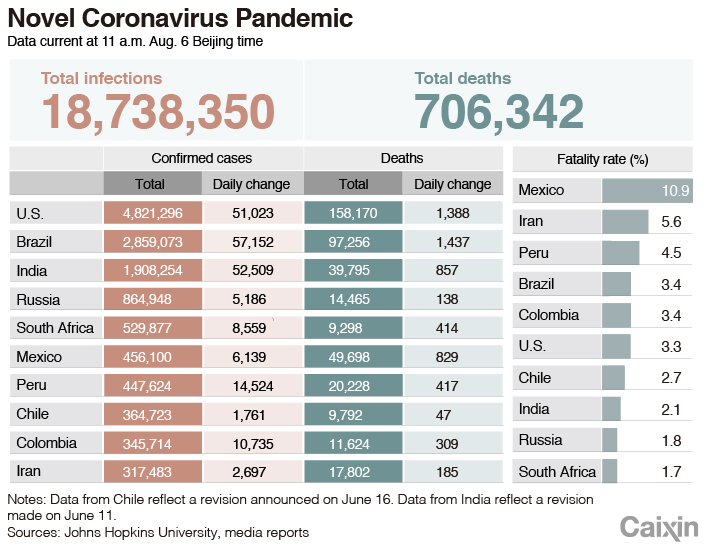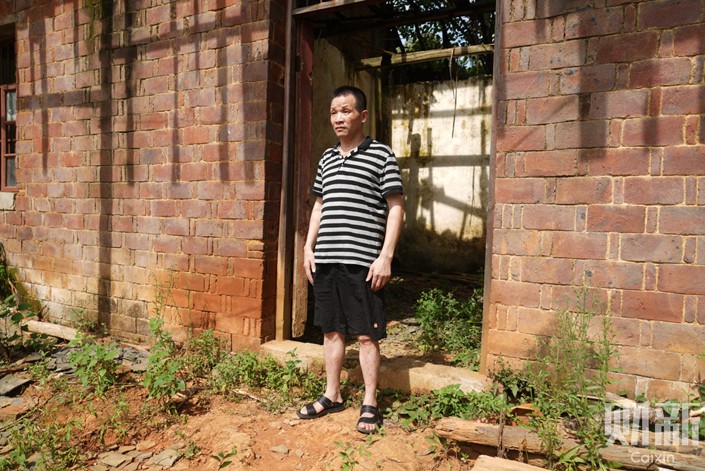China Business Digest: Troubled Baoshang Bank to Liquidate; AstraZeneca Inks China Deal for Oxford Vaccine Production
 |
|
|
 |
|
|
China’s central bank allows Baoshang Bank to go bankrupt after one year in state custody. AstraZeneca inks vaccine production deal with China’s Kangtai. The Trump administration announced an expansion of its “Clean Network” program that could lead to the removal of “untrusted” Chinese apps from U.S. stores. Meanwhile, TikTok plans to set up its first European data center in Ireland as it shifts its focus to Europe amid headwinds elsewhere. Also, travelers from Hong Kong may find more challenges to entering the mainland.
— By Mo Yelin (yelinmo@caixin.com) and Han Wei (weihan@caixin.com)
** TOP STORIES OF THE DAY
Baoshang bank to liquidate in final cleanup
China’s central bank said it would allow troubled regional lender to file for bankruptcy in a rare move to clean up risky assets in the banking sector. Baoshang Bank will liquidate its original shareholders’ equity and unprotected creditors’ rights in accordance with law, the central bank said.
AstraZeneca partners with Chinese drugmaker in Oxford vaccine production
AstraZeneca Plc and China’s Shenzhen Kangtai Biological Products Co. entered a deal to produce the U.K. drugmaker’s promising Covid-19 vaccine, according to an AstraZeneca statement on WeChat. Under the deal, Shenzhen Kangtai agreed to build capacity to make at least 100 million doses of the shot by year-end, and 200 million by the end of 2021.
Guangdong tightens virus scrutiny of travelers from Hong Kong
Authorities in Guangdong toughened virus control measures to block imported cases from Hong Kong after the recent resurgence in the city. Travelers entering the mainland from Hong Kong through the land border in Shenzhen and Zhuhai must present virus test issued within 24 hours to prove a negative result as of Aug. 7, authorities said. Previously, tests made within 72 hours before the arrival were eligible for Hong Kong travelers.
U.S. launches fresh attack on Chinese apps, tech
The U.S. government is looking to remove “untrusted” Chinese apps like TikTok and WeChat from U.S. app stores, Secretary of State Mike Pompeo announced Wednesday, alleging the apps pose “significant threats to the personal data of American citizens.”
As part of an expansion to an ongoing ‘Clean Network’ program, Pompeo said the U.S. government also wants to restrict Chinese cloud service providers and their ability to collect, store and process the data of U.S. citizens.
Xi sends condolences to Lebanon over deadly chemical blast
Chinese President Xi Jinping sent condolences Wednesday to his Lebanese counterpart, Michel Aoun, after a deadly ammonium nitrate explosion rocked the capital of Beirut on Tuesday evening. The blast killed at least 135 and wounded 5,000, according to local health authorities.
Tencent in talks to create $10 billion streaming giant
Tencent Holdings Ltd. is driving discussions to merge China’s biggest video game streaming platforms, Huya Inc. and DouYu International Holdings Ltd., both of which are U.S.-listed, in a deal that would allow it to dominate the area, sources said. (Bloomberg)
TikTok to set up first European data center in Ireland
TikTok, the short-video app owned by ByteDance Ltd., plans to set up a new data center in Ireland, which will become its first such facility in Europe, Roland Cloutier, TikTok’s global chief information security officer, announced in a blog post.
ByteDance is increasingly focused on Europe as it faces setbacks in the U.S., where officials have labeled TikTok a national security threat and the Chinese company is in the process of selling its operations. ByteDance has also chosen London as its new global headquarters, Caixin previously reported.
 |
** OTHER STORIES MAKING THE HEADLINES
• China’s top semiconductor manufacturing contractor SMIC reported on Thursday that its revenue rose 18.7% to $938.5 million during the three months through June. Gross profit rose 65% to $248.6 million.
• Battery-maker CATL deepened its partnership (link in Chinese) with Mercedes-Benz AG after both announced their tie-up would be expanded into research and development. The Chinese company has been selected as the German automaker’s “major” supplier and will provide batteries for its upcoming EQ electric cars.
• Chinese semiconductor stocks surged Wednesday after the State Council issued a set of policies to support the development of the integrated circuit and software industries.
• China’s insurance regulator issued a three-year action plan to improve the property insurance industry, the first of its kind since the China Banking and Insurance Regulatory Commission was established two years ago by merging the country’s banking and insurance regulators.
• Huang Zheng, founder of U.S.-listed e-commerce discounter Pinduoduo Inc., has stepped down as a board member (link in Chinese) of the registered company which operates Pinduoduo’s business in China, company registration records showed. This came one month after Huang stepped down as Pinduoduo’s CEO. The company made no comment on his resignation.
• Chinese electric-car maker Xpeng has raised $400 million from a group of investors including Alibaba, Qatar Investment Authority and Mubadala, CNBC reported Wednesday, citing two sources with knowledge about the deal.
** ON THE CORONAVIRUS
• As of Thursday afternoon Beijing time, the number of coronavirus infections globally surpassed 18.8 million, with the death toll passing 708,000, according to data compiled by Johns Hopkins University.
• On Wednesday, the Chinese mainland reported 37 new symptomatic coronavirus cases (link in Chinese), seven of which were imported, according to official data. The remaining 30 cases were all locally transmitted: 27 in the northwestern region of Xinjiang and three in Liaoning province in the northeast.
** AND FINALLY
Zhang Yuhuan, a 52-year-old man who was convicted of intentional homicide and spent nearly 27 years in prison, returned to his hometown Tuesday after a provincial high court overturned his conviction due to “unclear facts and insufficient evidence.” In 1993, Zhang was detained by police on suspicion of murdering two children, marking the start of the longest unjust imprisonment on record in the country.
 |
Zhang Yuhuan, who spent nearly 27 years in prison due to a wrongful conviction, stands Tuesday in front of his home in a village in Nanchang, East China’s Jiangxi province. |
Contact reporter Mo Yelin (yelinmo@caixin.com) and editors Flynn Murphy (flynnmurphy@caixin.com) and Joshua Dummer (joshuadummer@caixin.com)
Read More
China Business Digest: Gold Rallies to Record High Above $2,000; Central Bank Sets Up Fintech Unit
Support quality journalism in China. Subscribe to Caixin Global starting at $0.99.

- 1Cover Story: China Carves Out a Narrow Path for Offshore Asset Tokenization
- 2Drownings Shake Chinese Enthusiasm for Travel to Russia
- 3Over Half of China’s Provinces Cut Revenue Targets
- 4Li Ka-Shing’s Port Empire Hit by Forced Takeover Amid Panama Legal Dispute
- 5In Depth: China’s Mutual Fund Industry Faces Overhaul After a Banner 2025
- 1Power To The People: Pintec Serves A Booming Consumer Class
- 2Largest hotel group in Europe accepts UnionPay
- 3UnionPay mobile QuickPass debuts in Hong Kong
- 4UnionPay International launches premium catering privilege U Dining Collection
- 5UnionPay International’s U Plan has covered over 1600 stores overseas



